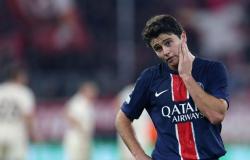On the big screen, they are called Jeanne and Claire. In real life, Audrey and Diane Pleynet are Alsatians, twins, pianists destined for an international career. Their momentum was broken when they were affected by an orphan disease which attacks bones, muscles and ligaments. But “the prodigious” don’t give up. What two hands can no longer play, four can do.
The essentials of the day: our exclusive selection
Every day, our editorial team reserves the best regional news for you. A selection just for you, to stay in touch with your regions.
France Télévisions uses your email address to send you the newsletter “The essentials of the day: our exclusive selection”. You can unsubscribe at any time via the link at the bottom of this newsletter. Our privacy policy
In theaters since November 20, “Prodigieuses” is a biopic freely inspired by the lives of two sisters, the twins Diane and Audrey Pleynet, with a passion for the piano deeply rooted in their hearts. The score should have been perfect, but a false note appeared in this well-defined trajectory. A disease so orphan that we haven’t even bothered to name it. We simply know that it eats away bones and weakens muscles and ligaments.
It was Diane who began to feel the first symptoms in 1992. Intense pain in her wrists, which spread to her elbows and up to her shoulders. Audrey will be hit a few months later. They were 15 years old, and dreamed of having an international career as pianists. They had the talent.
But the dream did not completely collapse. Both sisters are fighters. Despite their handicap, they competed in competitions, collected prizes, and were even admitted to the prestigious music school of the University of Karlsuhe. The disease, however, progresses, and for Diane, “even pressing a key had become almost impossible”
However, when in 2000, they were invited to play live as part of the Telethon under the Eiffel Tower in Paris, the opportunity could not be refused. So, they trained. Six months of intensive practice to produce three minutes of music. “Beyond the physical reconstruction, there was also the artistic reconstruction” explains Diane. Because we had to reinvent a way of playing. Distribute grades according to each person’s abilities, and even imagine the worst-case scenario. A sort of “safety mat” for the show to continue, no matter what.
It is this work which then made it possible to develop their own scheme. “The game we play today is the antithesis of what is normally done, and of what we have learned. We play in three dimensions. That is to say that we do not produce a sound at a given time, but rather staggered. We anticipate it with the amplitude of the gesture, more or less rapid, more or less intense” specifies Diane.
“The compliments from the public warm our hearts, but when the light goes out, we find ourselves in the doldrums of an almost impossible professional integration” testifies Diane Pleynet.
•
© Michel Bony
Over the years, the twins perfected their four-handed, perfectly complementary technique. “But we also had to mourn the loss of the entire musical encyclopedia that we had at our fingertips” she adds. Certain works were no longer possible. So, they designed arrangements, they composed their own pieces. Even today, they offer four-handed recitals. And dream of recording an album.
But the world of music is not always kind: the situation of Diane and Audray Pleynet is atypical, and the producers do not rush. Concerts are rare, because rooms with two pianos are often too expensive and the organization is too restrictive. “However, when we perform, the response from the public is excellent. All these compliments mean a lot to us, but deep down, we are broken. When the light goes out, we find the doldrums of an almost impossible professional integration, despite all the sacrifices.
Will the film bring a new dynamic? “We would like to believe it, but we have experienced so much disillusionment that now we are afraid of rejoicing too much. We protect ourselves“. Real life doesn’t always look like a pretty movie. But Diane and Audrey Pleynet are proof that we can be fragile, and extremely strong.





